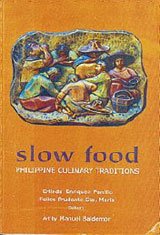Slow Food - romancing philippine cuisine
I am currently reading "Slow Food: Philippine Culinary Traditions" a compilation of Philippine essays on traditional Filipino cooking. I must say that this is a very scrumptious book and a delight to devour from cover to cover. 
The concept of the book is profound in its simplicity - get people to write about food that is prepared the old-fashioned way, which means, no short-cuts. The idea is actually admirable when one comes to realize that many kids today just do not have memories of hours spent in the kitchen helping put together family heirloom recipes. Today, even coconut cream comes in cans and there are all sorts of powdered mixes that has taken away the tedious manual labor of having to pound, squeeze, grate, marinate, etc.
These are essays I can relate to on many levels; essays that evoked powerful personal memories from my childhood and growing up years - of countless family reunions and special occasions, of terribly-longed for family recipes and delicacies (just thinking about them makes me awfully homesick). The whole book is like a delectable pot of sinigang. Each of the essays seems too unique and disparate on its own to blend with the others. But just like sinigang, the individual ingredients do come together quite beautifully in the end providing just the right amount of sourness, tartness, sweetness, and saltiness. Slurrrppp. Burp.
Of the many essays, my top favorite is "Remembering My Grandmother with Binuburan" by Joy Subido. This is a very personal piece, brimming with love and affection for a grandmother who, just like my own amah, must have been such a benevolent tyrant at the kitchen. So potent is the writing of this essay that even if I have never ever seen binuburan in my life, much less taste it, I could actually picture the fermented rice in my mind and could practically smell it while reading the piece. The piece is emotional without being melodramatic, for instance, it merely hints at some family pains and hurts being soothed over by the power of good cooking. This piece won the 2004 Doreen Fernandez Food Writing Award and I am not surprised at all.
Another piece that touched a raw chord was Pangalay Food by Cecilia Juntereal. This piece is about traditions and how food is somehow woven into it - or the other way around. In our country, in my family most specially it seems, traditions are often mere excuses to prepare feasts for everyone. Juntereal's piece is about biko and how she would always find this served on All Saints Day. Perhaps this is not at all strange, but there is a parallel tradition in our family which I have also imbibed and has practiced in my own household without even questioning why. We also prepare biko on All Saints Day along with pancit - and we share these with our neighbors. When I was living in San Andres, there was another family, from Negros who also did the same except that they cooked arroz a la valenciana (or what the Ilocanos call Bringhe).
There are more essays in the book worth mentioning - but I found that thinking about them produced two things: hunger and longing. Actually, I think both are the same in this case. So I am going to end here. Go check it out yourself. The essays are not that long and they come with recipes as well just in case you feel the urge to share the writers' experiences not only vicariously but in a culinary way as well.

Comments